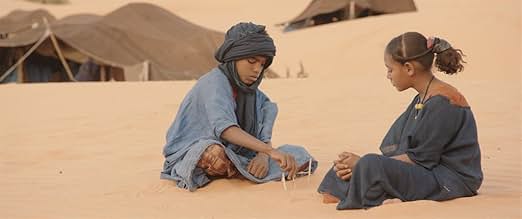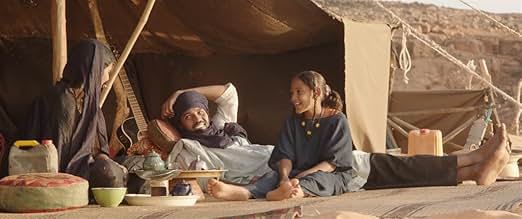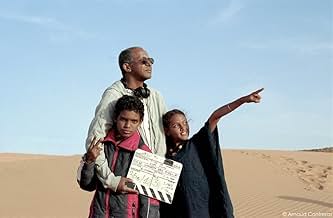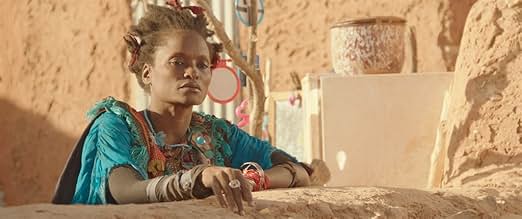VALUTAZIONE IMDb
7,1/10
18.743
LA TUA VALUTAZIONE
Un pastore vive con famiglia vicino a Timbuctù. La tranquillità vissuta tra le dune del deserto è bruscamente interrotta dall'arrivo di jihadisti che impongono la sharia.Un pastore vive con famiglia vicino a Timbuctù. La tranquillità vissuta tra le dune del deserto è bruscamente interrotta dall'arrivo di jihadisti che impongono la sharia.Un pastore vive con famiglia vicino a Timbuctù. La tranquillità vissuta tra le dune del deserto è bruscamente interrotta dall'arrivo di jihadisti che impongono la sharia.
- Regia
- Sceneggiatura
- Star
- Candidato a 1 Oscar
- 33 vittorie e 28 candidature totali
Ibrahim Ahmed
- Kidane
- (as Ibrahim Ahmed dit Pino)
Yoro Diakité
- Djihadiste
- (as Yoro Diakite)
Weli Kleïb
- Juge
- (as Weli Cleib)
Recensioni in evidenza
A film about the daily reality of Islam fundamentalism is a courageous project - even more so when the maker himself is a Muslim. For this reason alone, 'Timbuktu' cannot be praised enough. It will get plenty of international exposure, because this film is the first ever Oscar entry from Mauritania, and luckily it made the Foreign Language shortlist of nine candidates, out of 83 entries.
'Timbuktu' shows how Libyan jihadists invade Mali and turn the lives of the locals upside down. The Malinese are no longer allowed to play music or to smoke cigarettes, the women are obliged to cover their heads when in public, and sharia courts are issuing cruel and undeserved punishments. In spite of all this, the film is not at all harsh or bleak. On the contrary, most scenes show the Malinese living an idyllic life and trying to make the best of the situation. Some scenes are almost hilarious: the jihadists have to cope with serious language barriers to get their message across, they are unable to drive cars and even break their own rules by secretly smoking cigarettes.
Filmed in neighbouring Mauritania, the movie is full of beautiful landscapes, nice buildings and good-looking people. This is exactly what bothered me a little bit: sometimes you have the impression that you're watching a documentary on National Geographic Channel, showing the beauty of Mali. I can't imagine life in this dirt poor country being even half as peaceful and harmonious as is suggested in this film. A little more third world realism would have been appropriate, including the daily struggle for life of people living in extreme poverty.
Nevertheless, the film is a joy to watch, and contains some extremely beautiful scenes. One example is the scene of a football team playing a game without a ball, because it is confiscated by the jihadists. A perfect and original way to show how Muslim fundamentalism can be defeated, against all odds.
'Timbuktu' shows how Libyan jihadists invade Mali and turn the lives of the locals upside down. The Malinese are no longer allowed to play music or to smoke cigarettes, the women are obliged to cover their heads when in public, and sharia courts are issuing cruel and undeserved punishments. In spite of all this, the film is not at all harsh or bleak. On the contrary, most scenes show the Malinese living an idyllic life and trying to make the best of the situation. Some scenes are almost hilarious: the jihadists have to cope with serious language barriers to get their message across, they are unable to drive cars and even break their own rules by secretly smoking cigarettes.
Filmed in neighbouring Mauritania, the movie is full of beautiful landscapes, nice buildings and good-looking people. This is exactly what bothered me a little bit: sometimes you have the impression that you're watching a documentary on National Geographic Channel, showing the beauty of Mali. I can't imagine life in this dirt poor country being even half as peaceful and harmonious as is suggested in this film. A little more third world realism would have been appropriate, including the daily struggle for life of people living in extreme poverty.
Nevertheless, the film is a joy to watch, and contains some extremely beautiful scenes. One example is the scene of a football team playing a game without a ball, because it is confiscated by the jihadists. A perfect and original way to show how Muslim fundamentalism can be defeated, against all odds.
In the middle of the beauty of Saharian Africa, a shepherd and his lovely wife have to face the punishment of jihad's authorities in Timbuctu, a town in Mali. Religious authorities control even the most intimate gestures in the middle of crude poverty. A moral dictator, as usual conducts himself in double standard. Jihadism, persecutes not only sensual expressions such as the beauty of songs and music played by the people in the village, but also any expression of individuality. Amine Bouhafa's, music compositions are profoundly moving as also the sound of the original language, a soothing tender sound. The random of being born in such a place simply changes the life and options of the characters, leaving very little to free will.
I don't believe there is one frame in this film that is not gorgeous, that couldn't be displayed as a photograph at a gallery. The muted colors of the desert, the medieval architecture of the town, the tragically expressive faces always glowing in a magical light--all of it is almost painfully beautiful. The story is beyond tragic. By seemingly digressing into numerous anecdotes illustrating the quirks of the population, the director allows us to appreciate deeply the texture and social fabric of the community that is being poisoned by madness. We see in particular its effect on an extremely appealing but by no means sanctified family. This is one of the film's extraordinary strengths as well. No character is oversimplified; even the appalling jihadists are granted their humanity. I've seen "Boyhood" and "Birdman", the apparent favorites for the Oscar. "Timbuktu" utterly blows both those fine movies out of the water.
"Timbuktu" (2014 release from Mauritania; 99 min.) brings the story (fictional, by influenced by real events) of how the Mali town copes with the 'liberation' by jihadis. As the movie opens, we see the jihadis having a shooting practice by destroying the local wood statutes. The jihadis issue all kinds of rules ("smoking is forbidden! music is forbidden!"), much to the irritation of the local Mali population. We get to know one local family in particular, a husband and wife with their 12 yr. old daughter. They live a bit outside of the city center where the desert takes over, going about their daily business as best as possible. Then one day, one of the husband's cow accidentally destroys the fishing nets of the fisherman, who promptly kills the cow. The husband decides that he cannot tolerate this. To tell you more would spoil your viewing experience, you'll just have to see for yourself how it all plays out.
Couple of comments: first, it is a small miracle that a movie like "Timbuktu" could even have been made. Writer-director Abderrahmane Sissako shot the movie in Mauritania, which subs for Mali, but let's not kid ourselves. Mauritania is an "Islamic Republic", so it was no easy feat to shoot there either. Second, Sissako demonstrates again and again how much the local population resends the jihadis for uprooting their lives. There are several scenes in which a local man pleads with the jihadis ("where is forgiveness? where is leniency?"), to no avail of course. Playing soccer will cost you 20 leashes. Playing music comes at 40 lashes. Being in the room with someone from the opposite sex is another 40 lashes, and on and on. The fact that the neither side can understand the other (they speak Tamasheq in Timbuktu, the jihadis mostly speak Arabian, some also speak French or English) only makes the entire situation even more absurd. Second, while there are some shocking scenes in the movie, overall this is not a violent or graphic film. Almost on the contrary, in that the movie's editing and photography is done in such a way that it induces a false sense of peace and security. The photography in particular is pure eye-candy. Third, I have no idea where Sissako found these performers, but there are some wonderful performances, in particular from the wife and the 12 yr. old daughter. Bottom line: there is a good reason why this film is nominated for the Best Foreign Language Oscar, as it is a deeply moving film that will stay with you long after you have seen it.
The movie finally opened this weekend at my local art-house theater here in Cincinnati, and I went to see it right away. The matinée screening where I saw this at today was attended okay but not great, although I'm hoping that the bitter cold weather is a factor for that. If you like a top-notch foreign film that provides a glimpse of what real life under jihad is like, you cannot go wrong with this. "Timbuktu" is HIGHLY RECOMMENDED!
Couple of comments: first, it is a small miracle that a movie like "Timbuktu" could even have been made. Writer-director Abderrahmane Sissako shot the movie in Mauritania, which subs for Mali, but let's not kid ourselves. Mauritania is an "Islamic Republic", so it was no easy feat to shoot there either. Second, Sissako demonstrates again and again how much the local population resends the jihadis for uprooting their lives. There are several scenes in which a local man pleads with the jihadis ("where is forgiveness? where is leniency?"), to no avail of course. Playing soccer will cost you 20 leashes. Playing music comes at 40 lashes. Being in the room with someone from the opposite sex is another 40 lashes, and on and on. The fact that the neither side can understand the other (they speak Tamasheq in Timbuktu, the jihadis mostly speak Arabian, some also speak French or English) only makes the entire situation even more absurd. Second, while there are some shocking scenes in the movie, overall this is not a violent or graphic film. Almost on the contrary, in that the movie's editing and photography is done in such a way that it induces a false sense of peace and security. The photography in particular is pure eye-candy. Third, I have no idea where Sissako found these performers, but there are some wonderful performances, in particular from the wife and the 12 yr. old daughter. Bottom line: there is a good reason why this film is nominated for the Best Foreign Language Oscar, as it is a deeply moving film that will stay with you long after you have seen it.
The movie finally opened this weekend at my local art-house theater here in Cincinnati, and I went to see it right away. The matinée screening where I saw this at today was attended okay but not great, although I'm hoping that the bitter cold weather is a factor for that. If you like a top-notch foreign film that provides a glimpse of what real life under jihad is like, you cannot go wrong with this. "Timbuktu" is HIGHLY RECOMMENDED!
For someone raised in Mauritania as I was, it was quite something to watch the first Mauritanian movie nominated for a Foreign Film Oscar. I saw it in, of all places, in a movie theatre in Rio de Janeiro, the first week of its release in Brazil.
The language of cinema is truly universal as you see people who belong to an entirely different culture react in a similar way to someone from that culture. Of course there are some references not easy to get, such as the one to music lauding the Prophet by Mauritanian female artist Dimi mint Abba which is heard in a key scene showing how absurd these Islamists' prohibitions are.
Unsure, also, whether people can tell when different actors use different languages (Arabic, Tuareg, Bambara etc.).
The soccer game scene is one of the best I saw this year on the big screen, and the one with the killing of astounding beauty.
Definitely a great director at work here, despite obvious limited resources.
The language of cinema is truly universal as you see people who belong to an entirely different culture react in a similar way to someone from that culture. Of course there are some references not easy to get, such as the one to music lauding the Prophet by Mauritanian female artist Dimi mint Abba which is heard in a key scene showing how absurd these Islamists' prohibitions are.
Unsure, also, whether people can tell when different actors use different languages (Arabic, Tuareg, Bambara etc.).
The soccer game scene is one of the best I saw this year on the big screen, and the one with the killing of astounding beauty.
Definitely a great director at work here, despite obvious limited resources.
Lo sapevi?
- QuizIn 2015 Timbuktu became the first film shot in Mauritania by a Mauritanian director to win at the Cesar film awards. It won seven awards out of its eight nominations including Best Film, Best Director, Best Original Screenplay, Best Editing, Best Cinematography, Best Music and Best Sound, thus setting the record for being the African film with the most awards ever.
- BlooperIn the stoning scene, both man and woman are buried up to their necks. In a proper Islamic stoning (rajm), the woman should only be buried up to her waist.
- ConnessioniFeatured in The Oscars (2015)
- Colonne sonoreShooting The Statues
Composed, Arranged and Orchestrated By Amine Bouhafa
with The City of Prague Philharmonic Orchestra
© 2014 Universal Music France
I più visti
Accedi per valutare e creare un elenco di titoli salvati per ottenere consigli personalizzati
- How long is Timbuktu?Powered by Alexa
- Is this film about the Islamic State?
Dettagli
- Data di uscita
- Paesi di origine
- Siti ufficiali
- Lingue
- Celebre anche come
- Timbuktú
- Luoghi delle riprese
- Oualata, Mauritania(as Timbuktu)
- Aziende produttrici
- Vedi altri crediti dell’azienda su IMDbPro
Botteghino
- Lordo Stati Uniti e Canada
- 1.076.075 USD
- Fine settimana di apertura Stati Uniti e Canada
- 45.110 USD
- 1 feb 2015
- Lordo in tutto il mondo
- 7.179.391 USD
- Tempo di esecuzione1 ora 36 minuti
- Colore
- Proporzioni
- 2.35 : 1
Contribuisci a questa pagina
Suggerisci una modifica o aggiungi i contenuti mancanti



























